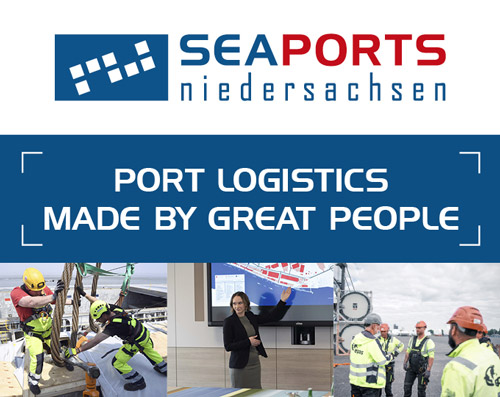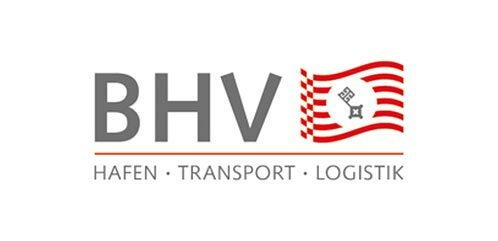Qualified trainees, students and skilled workers are in high demand in the maritime industry and logistics. LOGISTICS PILOT asked key players what employers in Bremen and Lower Saxony need to offer and which measures truly retain employees.
Jonna Fichtner, HR Business Partner Talent Development at EUROGATE in Bremen, knows the maritime labour market in northern Germany like the back of her hand. More recently, she has mentored young talent, including apprentices, students and interns, and is currently responsible for trainees and strategic development issues.
“Young Talent often comes from the local area,” Fichtner explains. “They’ll have already completed an internship with us or will come from families that have already been working here for two or three generations. Alongside these personal connections, job fairs and schools and universities in the north are major points of contact for us.”
The company also actively searches for young talent on LinkedIn, often approaching suitable candidates directly. “We also place job advertisements on platforms like Stepstone,” reports Robin Lemke, HR Operations Partner at EUROGATE in Hamburg, whose focus is on recruiting specialists and managers, particularly for the holding company. Indeed, approaching candidates directly has proven to be more reliable and cost-effective than using recruitment consultants.
Demand is nonetheless increasing. “Due, in particular, to our major automation project and the increased volume of cargo as a result of shipping alliances, we’re hiring new employees on a larger scale – including in the commercial sector,” adds Lemke. The company does not provide specific figures, however. The number of applicants depends on the position in question. “We’ve received a large number of applications for AI-related positions.” Finding good software developers is more challenging.
“The most difficult step for young talent is making them aware that there are opportunities at the port in the first place,” Fichtner continues. This is why a “Selection Day” is held for almost all jobs at the port, so potential apprentices and degree apprentices can get a first impression. “For our IT experts, for example, the results of their work are ultimately visible on the yard. This is what generates enthusiasm,” emphasises Lemke.
A responsible team player with integrity
Emphasis has shifted in recent years. “For us, personality is more important than pure skills,” states Lemke. The decisive factor is whether they fit into the team and add value to it. “We then work together to identify and develop any gaps in expertise. We don’t need a covering letter; a compelling CV will do. Plus, the trend of companies actively recruiting candidates as opposed to people simply applying for jobs is now more widespread.”
However, the answer to the skilled labour question lies not only in recruitment campaigns but also in giving people within the company a voice. This is where the “Lebenswelten J. MÜLLER” project at J. MÜLLER in Brake comes in. Trainees prepare presentations on their colleagues from different cultural backgrounds, talking about how they came to the company, their integration processes and the hurdles they faced when starting out.
The project, which came first in the 2024 “Prize for Innovative Training” (PIA), receives both professional and technical support from “Lebenswelten Wesermarsch”, a local initiative for intercultural exchange and media education. In a multiple-day workshop, the trainees learned the basics of documentary filmmaking and gained insights into both camera and editing techniques, and production processes, plus modules on social media, fake news and AI.
I was immediately taken with the idea of learning my colleagues’ stories and discovering what makes them tick – it’s often different from what you expect,” reports Mona Böschen, a third-year apprentice in freight forwarding and logistics services. She also enjoyed working with the other trainees to organise the planning and strengthen their teamwork skills.
To participate successfully in projects like these, Böschen believes the enjoyment in learning new things and the capacity for teamwork are paramount. “Organisation, a sense of responsibility and a good feel for how to allocate tasks are also important,” she says. “These skills, combined with determination and team spirit, are crucial for successful collaboration.”
This was also a personal step for Böschen, as she learned how to edit and shoot videos and, above all, recognised that most people have an exciting story behind them. “It’s okay to be a little different,” she smiles. She feels projects like this go a long way toward retaining young talent in the company in the long term. “I also think it’s important for young people to recognise their responsibilities, something this definitely encourages.”

“Job fairs, schools and universities in the north are major points of contact for us.”
Jonna Fichtner, HR Business Partner Talent Development at Eurogate

“For us, personality is more important than pure skills.”
Robin Lemke, HR Operations Partner at Eurogate
Youngsters set boundaries
Amelie Würdemann, who, in addition to her job as Global Ocean Specialist at BLS Bremer Logistic Service, is also Chair of the Board of the BHV Juniors, knows what role networks can play in recruitment. The currently almost 70 young members from Bremen’s maritime transport and logistics industry meet for monthly networking evenings and the annual Networking Bremen Calling (NBC) after-work event. In addition to discussing industry topics, these young professionals between the ages of 18 and 45 also talk about career issues.
“This offers great advantages for employers because someone from the network knows the person, which creates trust,” states Würdemann. “It’s also much cheaper for companies to find new employees through our network.” She herself has never formally applied to a company for a job other than for her training as a freight forwarding and logistics services clerk, as contact has always been established through personal conversations or events.
Würdemann is also familiar with the demands the younger generation has. “The younger generation values its work-life balance and sets clear boundaries,” she says. “As a freight forwarder, you have to love your job, but you also need a private life. Though it doesn’t apply directly to me, working from home is also important for many, especially for working mothers. The confidence to ask for this comes from the fact that the current job market allows for it. A simple fruit basket won’t cut it any more.” The younger generation also demands more flexibility on working hours. “If someone’s working on a project with Australia, then it’s best to work partly based on what time it is there, and not here.”
She also has a clear appeal to employers when it comes to further development. “It’s very important not only to make offers but also to listen to employees to find out what further training and additional qualifications are important to them,” she continues. “This could possibly involve a commitment to work for the employer for another year. Many people do their bachelor’s degree alongside their full-time job, and employers should support these employees fully.”

“Most people have an exciting story behind them.”
Mona Böschen, trainee freight forwarding and logistics services clerk at J. MÜLLER

“As a freight forwarder, you have to love your job, but you also need a private life.”
Amelie Würdeman, Global Ocean Specialist at BLS Bremer Logistics Service and Chair of the Board of the BHV Bremen Port and Logistics Representative Association
Better working conditions at sea
“When we talk about global economic structures, we often forget about seafarers,” says Johanna Zschornack, business and human rights advisor specialising in labour rights at sea at BeN, the Bremen Development Policy Network. “International labour agreements are a plus, but precarious working conditions often still prevail, especially in the lower ranks.”
“The legal requirement at sea is six hours of work followed by six hours of rest over seven days,” she explains. “This may sound good at first, but it doesn’t include any holidays or rest days. Ordinary seafarers spend nine to eleven months on board – for those in higher ranks it’s usually three to four months. And this can mean that they don’t have any extended rest periods of more than six hours during that time.” They spend their days off and holidays at home. “However, if they fall ill, they have no social security whatsoever,” Zschornack continues.
Internet access is also a problem. “There’s often not enough bandwidth on ships, and, on the high seas, some seafarers have no access at all – or sometimes only in the captain’s mess, where they can’t have a private conversation or even a little moan about their superiors.”
However, recruitment agencies are the seafarers’ contractual partners, not the shipping companies. “I expect the shipping companies do have a great deal of influence, though,” says Zschornack. And there are things the shipping companies can implement themselves. “Time and again, port state control inspections uncover duplicate work logs – the ‘real’ ones and ones created especially for use at inspection time,” she adds.
However, many employees are afraid to report their concerns for fear of being blacklisted, meaning their chances of being hired again are jeopardised. “What’s more, working on board is isolationary – there’s less interaction than on land. But a lot’s changing here, for example in the form of online tools,” Zschornack is pleased to report.
“The worst problems aren’t here in Europe or in North America, rather on small boats in other parts of the world,” admits Zschornack. For many in Germany, however, this concept is quite abstract. “When it comes to textiles, buyers are aware of the working conditions in countries like Bangladesh, which they can also influence. When it comes to transport, it’s difficult to use your own consumer behaviour to influence working conditions.”
The network therefore focuses primarily on providing information and raising awareness among the general public in the state of Bremen, for example by giving lectures and workshops. “We also work closely with, among others, shipping companies, port authorities such as bremenports, and trade unions such as the International Transport Workers’ Federation (ITF) and Verdi, as well as the German Seamen’s Mission.” Port tours that focus on global connections and working conditions on board are also offered. The aim is to work with politicians, business, academia and civil society to highlight global problems and seek appropriate solutions. “This requires many small steps across various channels,” adds Zschornack. bremenports has already included the issue of fair working conditions in maritime shipping in its “Sustainability Report”.

Johanna Zschornack,
business and human rights advisor specialising in labour rights at sea at BeN, the Bremen Development Policy Network
Nadine Hellmold, who used to run her own logistics company and who has been working as a consultant and trainer for HR and strategy with her company Co-Check for over ten years, knows from both perspectives how good HR work can also be successful in small and medium-sized maritime industry and logistics companies. “I see myself as my clients’ external human resources department,” she says. “You have to have the sensitivity and understanding for how important this is.”
One example is the etiquette seminars she offers to BHV members. “These are very well received.” A central topic is informal or formal address. “Many companies want to be hip and communicate externally using informal language,” Hellmold says. “This often makes youngsters unsure about how to behave appropriately internally. Another change is that the concept of ‘ladies first’ no longer exists. Today, hierarchy is the form of address.”
Crucial at the moment is permanent staff retention – to do that, the workers must identify with the company. “Authentic, sincere values that are actively practised are key,” Hellmold indicates. “My advice is to build emotional loyalty to your company among existing staff.” This also helps to encourage more employees to adopt responsibility. “Many companies are lacking in this area.”
People often misunderstand what modern leadership is. “Instead of imposing decisions from above, today it’s about coaching employees, being a mentor and developing and promoting team members individually,” says Hellmold. “It’s not fruit baskets or salaries that are decisive, but factors such as hybrid working and a sense of purpose. If you want employees to be enthusiastic about your company in the future, you have to focus on cooperation – personal relationships are crucial to success.” She therefore advises investment in soft skills and taking employees’ needs seriously. “That’s decisive.”
Green recruiting
Miriam Charif, Head of HR at PTS Logistics in Bremen, also confirms that sustainability is becoming an increasingly important factor in recruitment. “Green skills are becoming increasingly important for us in the logistics sector, as sustainable processes are both ecologically and economically relevant.” Even today, during the recruitment process PTS checks whether applicants demonstrate awareness of resource conservation and efficient processes. “In the future, such skills will be a decisive factor in remaining competitive and achieving sustainability goals together,” says Charif.
“Practical content is already being used during training to anchor sustainability skills, such as the efficient use of resources and environmentally friendly processes,” she continues. In its further training, the company addresses current topics such as basic ESG regulations, CO₂ reduction and reusable or recyclable packaging solutions, and promotes the exchange of experiences within the team. During the induction phase, huge importance is attached to sensitising new colleagues to the company’s sustainability goals early on and actively involving them in projects – the motto is “involve them early to make it happen”. Intensive exchange with customers and at networking events such as ENVOCONNECT is also important. “Only together can we master the transformation by developing and implementing ideas for green logistics.” (cb)

“It’s not fruit baskets or salaries that are decisive, but factors such as hybrid working and a sense of purpose.”
Nadine Hellmold, consultant and trainer for HR and strategy with her company Co-Check and spokesperson for the “Further training” BHV working group

“Green skills are becoming increasingly important for us in the logistics sector.”
Miriam Charif, Head of HR at PTS Logistics. Spokesperson for the “Recruiting young talent and skilled workers” BHV working group





